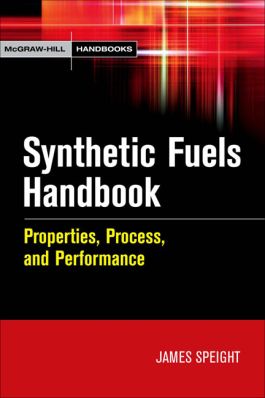Synthetic Fuels Handbook
Step 1. Download Adobe Digital Editions Both PC and Mac users will need to download Adobe Digital Editions to access their eBook. You can download Adobe Digital Editions at Adobe's website here.
Step 2. Register an Adobe ID if you do not already have one. (This step is optional, but allows you to open the file on multiple devices) Visit account.Adobe.com to register your Adobe account.
Step 3: Authorize Adobe Digital Editions using your Adobe ID. In Adobe Digital Editions, go to the Help menu. Choose “Authorize Computer.”
Step 4: Open your file with Adobe Digital Editions. Once you’ve linked your Adobe Digital Editions with your Adobe ID, you should be able to access your eBook on any device which supports Adobe Digital Editions and is authorized with your ID. If your eBook does not open in Adobe Digital Editions upon download, please contact customer service
Natural Gas and Natural Gas Hydrates
Petroleum and Heavy Oil
Tar Sand Bitumen
Coal
Oil Shale
Synthesis gas
Crops
Wood Sources
Biomass
Industrial and Domestic Waste
Landfill Gas
Appendices
Capitalize on the Vast Potential of Alternative Energy Sources Such as Fuel Cells and Biofuels
Synthetic Fuels Handbook is a comprehensive guide to the benefits and trade-offs of numerous alternative fuels, presenting expert analyses of the different properties, processes, and performance characteristics of each fuel. It discusses the concept systems and technology involved in the production of fuels on both industrial and individual scales.
Written by internationally renowned fuels expert James G. Speight, this vital resource describes the production and properties of fuels from natural gas and natural gas hydrates…tar sand bitumen…coal…oil shale…synthesis gas…crops…wood sources…biomass…industrial and domestic waste…landfill gas...and much more. Using both U.S. and SI units, Synthetic Fuels Handbook features:
- Information on conventional and nonconventional fuel sources
- Discussion of the production of alternative fuels on both industrial and individual scales
- Analyses of properties and uses of gaseous, liquid, and solid fuels from different sources
- Comparison of properties of alternative fuels with petroleum-based fuels
Discover All the Benefits and Trade-Offs of Synthetic Fuels
• Fuel sources: conventional and nonconventional • Natural gas and natural gas hydrates • Petroleum and heavy oil • Tar sand bitumen • Coal • Oil shale • Synthesis gas • Crops • Wood sources • Biomass • Industrial and domestic waste • Landfill gas • Comparison of the properties and uses of gaseous fuels from different sources • Comparison of the properties and uses of liquid fuels from different sources • Comparison of the properties and uses of solid fuels from different sources
